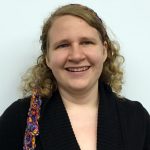
This Forum Update was provided by Megan Browndorf, Research and Instruction Librarian, Albert S. Cook Library, Towson University.
It was my pleasure to be invited to write for DLF about my first experience at the DLF Forum. As an instruction librarian at Towson University with a bent towards understanding the connection between digital humanities and the undergraduate experience, it has been a terrific opportunity.
The keynote address began my morning and set the tone for three themes that weaved through the different sessions I attended: First, “The ends of expertise”; second, “project-based learning”; and third, “people over projects.” In her keynote, Bethany Nowviskie, director of the Scholar’s Lab at UVA, spoke eloquently on a slowly developing trend in scholarship away from specialization toward bigger picture questions. She convincingly argued that as scholars we have a moral imperative to think big and consider how expertise can be used to help us as scholars and educators, not only to understand the world and social structures we live in, but to consciously act to change them for the better.
Equally important was Nowviskie’s praise of failure and declaration that “Digital Humanities has a deep and abiding love of ignorance.” It was hard to disagree that ignorance and failure is the space in which new knowledge is formed and the boundaries of current knowledge are pushed. Taking that risk is the only way that we can come to understand what will not work and what we have yet to know.
It was a fantastic introduction for day one of a solution-focused conference that also aimed at assessing the bigger picture. The first session I attended, titled “Professional Development for Digital Scholarship,” brought together representatives from four universities to talk about how they bring together librarians and professionals working in digital scholarship to build proficiency in the tools and processes of each other’s fields.
The big take-away from this session was that the best way to learn how to develop digital projects is to engage in project based learning—to have actual digital projects to work on. Columbia is creating a project on their local neighborhood, Morningside Heights, and documenting their learning experience on http://www.developinglibrarian.org. Indiana University’s Research Now center for digital research is actively cross-training reference and technical staff by developing a digital archive on the history of IU Libraries. While there were many other interesting points that I took from this session, the biggest take-away is that the best way to train for using these skills is to have an active project in which to use learned skills.
The third theme that that I encountered at multiple sessions was this idea of “people over projects,” an idea referenced in Nowviskie’s keynote. The entire point of the digital work that we create is to provide tools and resources to people and create materials that help us further our understanding of the human experience. Nowhere was this more evident than the session I attended on “Catastrophic Success” and digital scholarship in liberal arts colleges. Coming from a university with a significant liberal arts focus, I was particularly interested in the way that these undergraduate-focused institutions leveraged digital scholarship for teaching. Hiring students and involving them in creating these projects, creating projects designed specifically for undergraduate students, and using digital scholarship within undergraduate classes helped to underline this very “people over projects” ethos. This was echoed in the Snapshots session I attended, which provided seven-minute sessions on various projects. All of these projects prioritized the needs of the users over the ease of the project itself.
Nowviskie said, “all problems are shared problems.” While many of these sessions offered narrow understanding, together they forced me to toward broader thinking, and the bigger picture problems in digital scholarship, education, and humanities. I very much look forward to seeing what DLF will offer tomorrow. One thing I know for certain is that I will keep Bethany Nowviskie’s call to long-termism and big-picture thinking in the back of my head at every session I attend.
